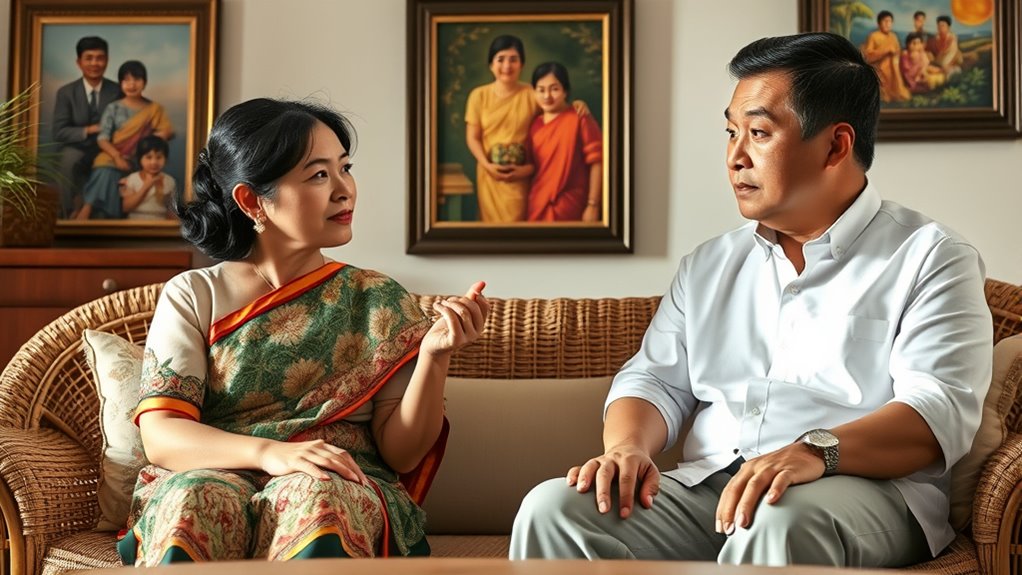To handle disagreements in a Filipina marriage, recognize the importance of cultural context and family ties. Practice active listening and express your feelings using “I” statements to foster open communication. Approach discussions empathetically, focusing on collaborative problem-solving. Don’t hesitate to seek professional help if conflicts escalate, as neutral perspectives can facilitate understanding. Remember, resolving disputes strengthens your relationship and guarantees harmony. Keep exploring to uncover more effective strategies for nurturing your marriage.
Key Takeaways
- Emphasize active listening and validate each other’s feelings to foster understanding and connection during disagreements.
- Utilize “I” statements to express concerns without placing blame, reducing defensiveness in discussions.
- Incorporate family perspectives and seek blessings from elders, acknowledging the cultural importance of familial involvement in resolutions.
- Approach conflicts with an open mindset, focusing on collaborative solutions that consider both partners’ needs and viewpoints.
- Consider seeking professional help for neutral guidance, enhancing communication skills, and fostering empathy in the relationship.
Understanding Cultural Context in Filipino Marriages

Understanding the cultural context in Filipino marriages is essential if you want to navigate the complexities of this unique union. Rooted in indigenous traditions, Filipino marriages emphasize community involvement and familial alliances. The influence of Spanish colonization introduced Catholic rituals, blending with local customs and creating a rich tapestry of practices. Respecting elders and seeking their blessings play significant roles in this culture, highlighting the importance of family ties. Marriage unites not just couples but also their families and communities, reflecting the deep-rooted values that underpin these unions.
Marriages often serve as unifying forces, with community participation reflecting strong social bonds. Traditional practices like pamamanhikan and pa-alam further solidify the commitment between families. While modern influences evolve the narrative, these foundational elements remain important in understanding Filipino marriage dynamics and the values that guide them.
Effective Communication Strategies for Conflict Resolution

When managing conflicts in a Filipina marriage, effective communication strategies can make all the difference.
Start by practicing active listening; focus on your partner’s words and validate their feelings, even if you don’t agree. Use paraphrasing to clarify their message and ask open-ended questions to encourage deeper dialogue.
Assertive communication is key—express your needs using “I” statements to reduce defensiveness. Non-verbal cues can also enhance your message, so be mindful of your body language during discussions. Choose the right time and place for discussions, ensuring a comfortable environment.
Assertive communication fosters understanding; use “I” statements and choose the right environment for meaningful discussions.
If emotions run high, take breaks to cool down. Regular check-ins maintain open communication and prevent issues from escalating.
Finally, don’t hesitate to seek external support when needed, as it can provide fresh insights and foster healthier communication patterns.
Techniques for Resolving Disagreements

Effective communication sets the stage for resolving disagreements in a Filipina marriage. Start by practicing active listening; don’t interrupt your partner, and show empathy to validate their feelings.
Clearly express the specific behavior that’s bothering you and the change you’d like to see. Approach discussions with an open mindset, welcoming different perspectives.
If emotions run high, take time-outs to cool down before engaging in sensitive topics. Use respectful tones to prevent escalation, and set boundaries to avoid misunderstandings.
Focus on collaborative problem-solving to identify mutually beneficial solutions, and agree on a plan that outlines each person’s contributions.
Finally, schedule follow-ups to guarantee you’re both on track and maintaining harmony in your relationship.
The Role of Professional Help in Managing Conflicts

While managing conflicts in a marriage can be challenging, seeking professional help can provide invaluable support and guidance.
External mediators bring a neutral perspective, helping you identify core issues and encouraging open communication. They teach effective strategies to express feelings respectfully and foster empathy, allowing both partners to understand each other better.
With their expertise, you can work towards long-term solutions that strengthen your relationship. Additionally, professional guidance can help create a supportive network, easing the stigma around seeking help.
Legal Considerations for Couples Facing Disputes

Understanding the legal landscape is essential for couples facing disputes in a Filipina marriage, as it outlines your rights and responsibilities.
Navigating legal issues in a Filipina marriage is crucial for understanding your rights and responsibilities during disputes.
The Family Code emphasizes mutual obligations, including fidelity and support, while the absence of divorce laws pushes couples towards annulment or legal separation.
Grounds for legal separation include infidelity, abandonment, and abusive conduct, with protections for the aggrieved spouse.
If infidelity harms you emotionally, you can seek damages, but be prepared to present compelling evidence in court.
Annulment requires proving psychological incapacity, a complex process that demands expert testimony.
Frequently Asked Questions
What Are Common Sources of Conflict in Filipina Marriages?
In Filipina marriages, common sources of conflict often arise from financial issues, differing cultural expectations, and communication barriers.
You’re likely to face disagreements over spending habits, family responsibilities, and child-rearing practices. Misunderstandings can escalate due to language differences or distinct cultural norms.
Additionally, expectations regarding gender roles might clash, leading to further tension. Recognizing these potential sources of conflict can help you navigate the complexities of your relationship more effectively.
How Does Extended Family Influence Marital Disagreements?
Ah, the joys of family meddling! When it comes to marital disagreements, your extended family can feel like a well-meaning army of advisors, ready to swoop in.
They often have a say in your decisions, whether it’s your grandparents’ wisdom or your cousin’s unsolicited advice. You might find yourself maneuvering through their expectations, financial pressures, and cultural norms, all while trying to maintain harmony.
It’s a delicate dance, and you’ve got to lead!
What Role Does Gender Play in Resolving Conflicts?
Gender plays a significant role in resolving conflicts by shaping expectations and behaviors.
You might find that men often take on a decisive role, while women may use their understanding of family dynamics to promote harmony. This can lead to different approaches; men might confront issues directly, while women tend to prioritize emotional connections.
How Can Cultural Expectations Affect Individual Emotions During Disputes?
When the storm brews during disputes, cultural expectations can feel like a heavy blanket, stifling your emotions.
You might find yourself bottling up frustrations, prioritizing harmony over honesty, and feeling torn between family loyalty and personal feelings.
This emotional whirlwind can lead to resentment, as you suppress your true thoughts to maintain peace.
The weight of these unexpressed feelings can create a chasm, making it harder to connect and resolve issues openly.
What Are Signs That a Disagreement May Escalate Into a Larger Issue?
You’ll notice signs that a disagreement might escalate into a larger issue when arguments become frequent and emotions run high.
If harsh words start flying and defensiveness kicks in, tensions are likely rising. Ignoring each other’s emotional needs or involving outside parties can worsen the situation.
Also, if unresolved past conflicts come up, it’s a clear indication that the disagreement could spiral out of control.
Stay alert to these signals and address them early.
Conclusion
In managing disagreements in a Filipina marriage, remember that open communication is your guiding star. Embrace the cultural nuances that shape your relationship, and don’t hesitate to seek help when needed. By employing effective conflict resolution techniques, you can turn potential storms into opportunities for growth. Ultimately, a strong partnership thrives on understanding and compromise, ensuring love remains at the heart of your journey together. Keep the flame of connection alive, even in challenging times.









